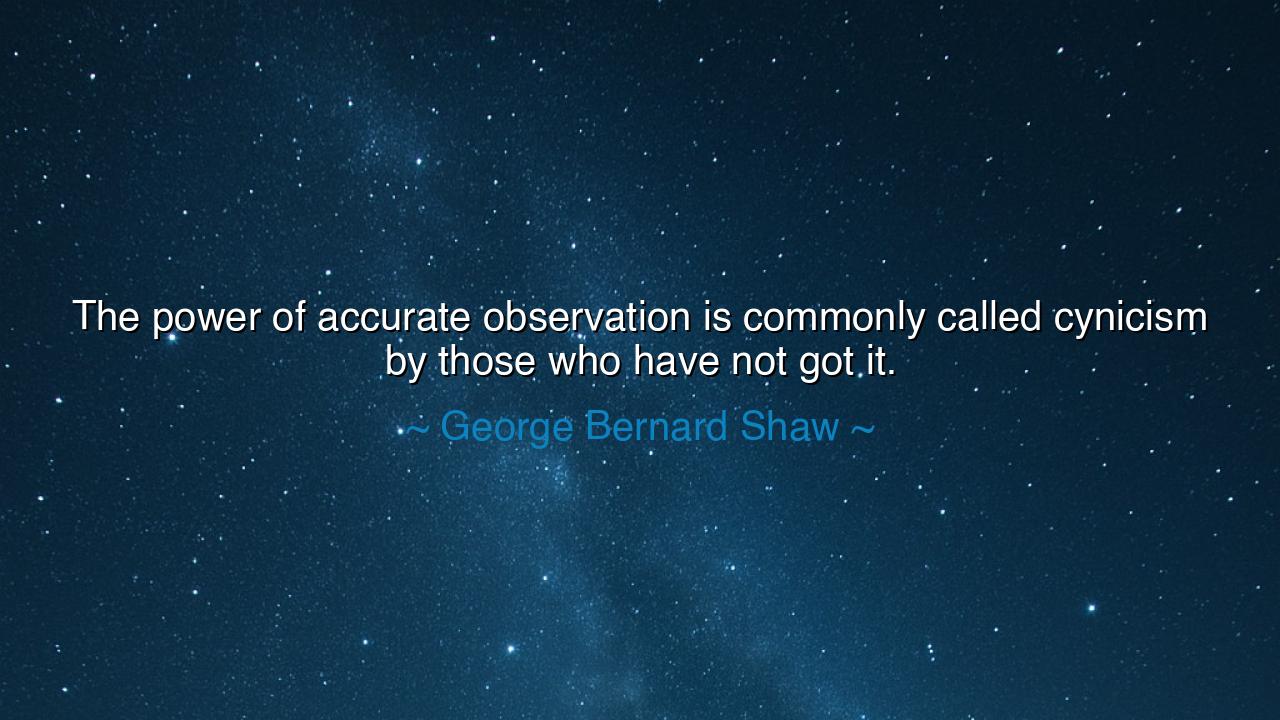
The power of accurate observation is commonly called cynicism by
The power of accurate observation is commonly called cynicism by those who have not got it.






Hearken, O children of the ages, to the sharp and piercing words of George Bernard Shaw, who unveils a truth both profound and uncomfortable. He declares that “The power of accurate observation is commonly called cynicism by those who have not got it.” In this, Shaw teaches that those who perceive the world with clarity, seeing through its illusions and pretenses, are often misunderstood. To the many who live in comfortable self-deception, truth appears harsh, and so they dismiss it as mere cynicism, failing to recognize the rare gift of discernment.
The power of accurate observation is a strength of mind and spirit. It demands courage, for to see clearly is to face realities that others may wish to hide or ignore. Those who possess this gift are like lantern-bearers in the dark, illuminating hypocrisy, folly, and corruption. Yet, because their vision disrupts illusions, they are often met with hostility. The blind resent those who speak of sight, and so they label the truth-teller a cynic, mistaking insight for bitterness.
History offers many examples of this struggle. Consider Diogenes of Sinope, the ancient Greek philosopher who walked with a lantern in daylight, claiming to search for an honest man. His unflinching exposure of human vanity and falsehood caused many to scorn him, calling him mad or cynical. Yet Diogenes was no mere scoffer; he wielded accurate observation as a tool to awaken others to truth, much like Shaw describes. What others saw as mockery was, in truth, a mirror held to society’s flaws.
Even in modern times, this principle endures. Reformers, journalists, and visionaries who speak plainly about corruption or injustice are often accused of being overly negative. Yet their so-called cynicism is often nothing more than clarity. They see what others refuse to acknowledge, and in daring to name it, they invite both resistance and transformation. Thus, accurate observation becomes a revolutionary act.
O children of the future, carry this teaching in your hearts: do not mistake those who speak hard truths for cynics, nor dismiss the gift of clear perception as mere pessimism. Seek instead to cultivate the power of accurate observation, for it is the first step toward wisdom and change. Understand that truth may wound before it heals, and that those who see clearly are often misunderstood by those who cannot bear to look.
Thus, Shaw’s words echo across the centuries, calling us to honor the seers and truth-tellers among us. For in their vision lies not despair, but the hope of a world no longer built upon lies, a world where clarity and courage walk hand in hand.






HMLe thi hong my
Shaw’s words prompt me to think about the difference between insight and attitude. Is it possible that people with sharp observational skills are frequently misunderstood because their conclusions challenge conventional thinking? I’m curious whether this mislabeling of discernment as cynicism is universal or culturally specific. How can we distinguish between genuine pessimism and the clear-eyed assessment of reality, and what strategies can help convey observations without alienating others?
UGUser Google
I find this statement intriguing because it highlights the social cost of insight. It makes me question why people often equate discernment with negativity. Could it be that those who lack the skill of observation project their discomfort onto those who see clearly? I wonder how this dynamic plays out in media, politics, or workplace environments, where truth is sometimes unwelcome. How can someone maintain accuracy in judgment while navigating the perceptions of others?
NQNguyen Thi Nhu Quynh
This quote makes me reflect on the tension between realism and perception. If accurate observation is often called cynicism, does that mean society prefers optimism or naivety? I’m curious whether Shaw implies that most people are unwilling to face uncomfortable truths. How does one communicate insights effectively without being misunderstood? I’d like a perspective on whether this mislabeling discourages critical thinking and observation in everyday life, especially in professional or personal settings.
NYNhi Yen
Reading this, I’m struck by the idea that perception and judgment can be misunderstood by others. Shaw seems to suggest that being perceptive or realistic is often mislabeled as negativity. I wonder if this applies more in social situations where honesty or critical thinking is unpopular. How can someone cultivate accurate observation without being dismissed as cynical? Is it possible that society values comfort over truth, and how does that affect those who see clearly?